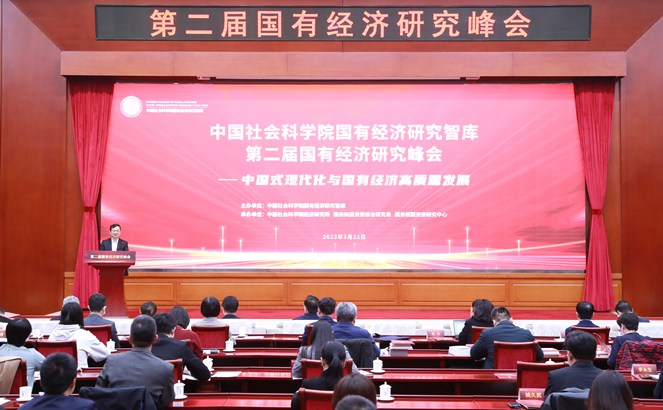


A scene of the summit Photo: Zhu Gaolei/CSST
On March 21, the Second Summit on State-Owned Economy Research was convened in Beijing, under the theme “Chinese Modernization and High-Quality Development of the State-Owned Economy.” The summit was sponsored by the State-Owned Economy Research Think Tank at the Chinese Academy of Social Sciences (CASS) and organized by CASS’s Institute of Economics, the Bureau of Comprehensive Research at the State-owned Assets Supervision and Administration Commission of the State Council (SASAC), and the Research Center at SASAC.
According to CASS President Gao Xiang, the State-owned Economy Research Think Tank was jointly founded by CASS and SASAC in order to implement the spirit of General Secretary of the CPC Central Committee Xi Jinping’s important exposition on State-owned enterprises (SOEs) and the State-owned sector, and conduct in-depth research on major theoretical and practical issues facing the development of SOEs in the new era.
“A modern country is inseparable from modern enterprises,” said SASAC Chairman Zhang Yuzhuo in his speech at the summit. State-owned capital and central SOEs will strive to transform SOEs into modern entities that meet the requirements of Chinese modernization.
SOEs are an important element and force in promoting Chinese modernization, Zhang said, adding that the enterprises should shoulder their new responsibilities and missions in promoting Chinese modernization.
Ning Gaoning, a member of the academic committee at the State-owned Economy Research Think Tank, noted that SOEs reform has been deepened in recent years. Especially through the recent three-year action plan for SOEs reform, State-owned capital and central SOEs have achieved impressive results.
Nonetheless, Ning pointed out longstanding weaknesses in technological innovation, international operation, and other fields, underscoring the necessity to continue to provide feasible solutions to reform and accelerate the progress towards world-class enterprises by benchmarking with them.
Regarding the key direction of the new round of SOEs reform, Huang Qunhui, director of the Institute of Economics at CASS, said it is necessary to emphasize SOEs’ missions and responsibilities in the course of Chinese modernization, and further improve the layout of the State-owned sector and adjust its structure.
Huang believes that through deepened reforms, SOEs should strive to play a leading and supporting role in building China’s self-reliance and strength in science and technology, further modernizing the industrial chain, advancing common prosperity, and smoothing the economic cycle.
“Increasing R&D investment in the innovation of common basic technologies is the core mission of SOEs,” Huang said, adding that they should become the supply source of common basic technology innovation.
According to the summit, SASAC is stepping up its plans for a new round of deepening and upgrading SOEs reform, of which a highlight would be optimizing the layout of State-owned capital and adjusting its structure.
To be more specific, SASAC will steer State-owned capital and enterprises to focus on their main functions in the real economy, vigorously advance strategic regrouping and professional merger and consolidation in a market-oriented manner, and intensify the layout of emerging strategic industries, such as new-generation information technology, artificial intelligence, and integrated circuits. It will also speed up the realization of independence and controllability in important fields and key nodes, and spur the digital, intelligent, and green transformation and upgrading of traditional industries.
The summit released some research outcomes of the State-owned Economy Research Think Tank, including Blue Book of the State-owned Economy (2021), Research on the Reform and Development of State-owned Enterprises on a New Journey, and a book series on SOEs and the construction of a new development pattern.